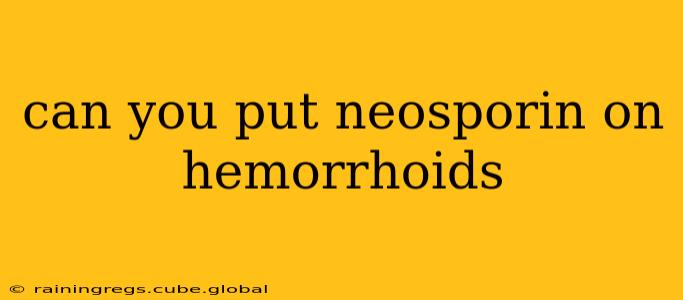Can You Put Neosporin on Hemorrhoids? Understanding Topical Treatments for Hemorrhoids
Hemorrhoids, those painful swollen veins in the anus and rectum, are a common ailment affecting many. When dealing with the discomfort and irritation of hemorrhoids, many turn to readily available over-the-counter remedies. One frequently asked question is: Can you put Neosporin on hemorrhoids? The answer isn't a simple yes or no, and understanding why requires a closer look at both Neosporin and the specific needs of hemorrhoid treatment.
Neosporin, a popular antibiotic ointment, is effective against bacterial infections. It contains a combination of antibiotics—neomycin, polymyxin B, and bacitracin—that work to fight infection. While it can help prevent secondary infection in minor wounds, it's not designed to treat the underlying cause of hemorrhoids.
H2: What Causes Hemorrhoids?
Before addressing the Neosporin question, let's understand what hemorrhoids are. Hemorrhoids occur when the veins in the anus and rectum become swollen and inflamed. This can be caused by several factors, including:
- Straining during bowel movements: This is a common culprit, putting extra pressure on the veins.
- Chronic constipation or diarrhea: Both can contribute to irritation and inflammation.
- Pregnancy: The increased pressure on the pelvic veins during pregnancy can lead to hemorrhoids.
- Obesity: Excess weight puts additional strain on the veins in the pelvic area.
- Prolonged sitting or standing: These activities can impede blood flow and contribute to swelling.
H2: Why Neosporin Isn't the Ideal Hemorrhoid Treatment
While Neosporin can help prevent infection if a hemorrhoid becomes broken or irritated, it won't address the underlying venous issues causing the hemorrhoid. Applying it might provide temporary relief from surface discomfort, but it won't shrink the hemorrhoid itself. In fact, some individuals are allergic to one or more of Neosporin's components, leading to further irritation.
H2: What are the Best Treatments for Hemorrhoids?
The most effective approach to hemorrhoid treatment depends on the severity of the symptoms. Mild hemorrhoids often respond well to home remedies and over-the-counter treatments, including:
- High-fiber diet: Increasing fiber intake softens stools, reducing straining during bowel movements.
- Increased fluid intake: Staying well-hydrated helps prevent constipation.
- Over-the-counter creams and ointments: Many products containing hydrocortisone or other soothing ingredients can reduce inflammation and pain. These are often more appropriate than Neosporin for direct hemorrhoid treatment.
- Sitz baths: Soaking in warm water can soothe irritated tissue.
- Topical anesthetics: Products containing lidocaine or benzocaine can provide temporary pain relief.
For more severe hemorrhoids, medical intervention might be necessary. This could include:
- Rubber band ligation: Cutting off the blood supply to the hemorrhoid.
- Sclerotherapy: Injecting a solution to shrink the hemorrhoid.
- Hemorrhoidectomy: Surgical removal of the hemorrhoid.
H2: When Should I See a Doctor About My Hemorrhoids?
It's crucial to consult a doctor if:
- Your hemorrhoids are severely painful or bleeding heavily.
- You experience symptoms that persist for more than a week despite home treatment.
- You notice any signs of infection, such as increased pain, swelling, or pus.
H2: Can I Use Neosporin on a Hemorrhoid That's Bleeding?
If a hemorrhoid is bleeding, it's important to focus on stopping the bleeding and preventing infection. While a small amount of Neosporin might help prevent infection in the case of a minor break in the skin, prioritizing hemostasis (stopping the bleeding) is paramount. Applying direct pressure to the area and seeking medical advice is recommended. A healthcare professional can determine the appropriate treatment and address any potential complications.
In conclusion, while Neosporin might offer minimal help in preventing secondary infection in some cases, it's not a primary treatment for hemorrhoids. Focusing on lifestyle changes, over-the-counter remedies designed for hemorrhoids, and seeking medical attention when necessary will provide more effective and safer relief. Always consult a healthcare professional for diagnosis and treatment of hemorrhoids.
